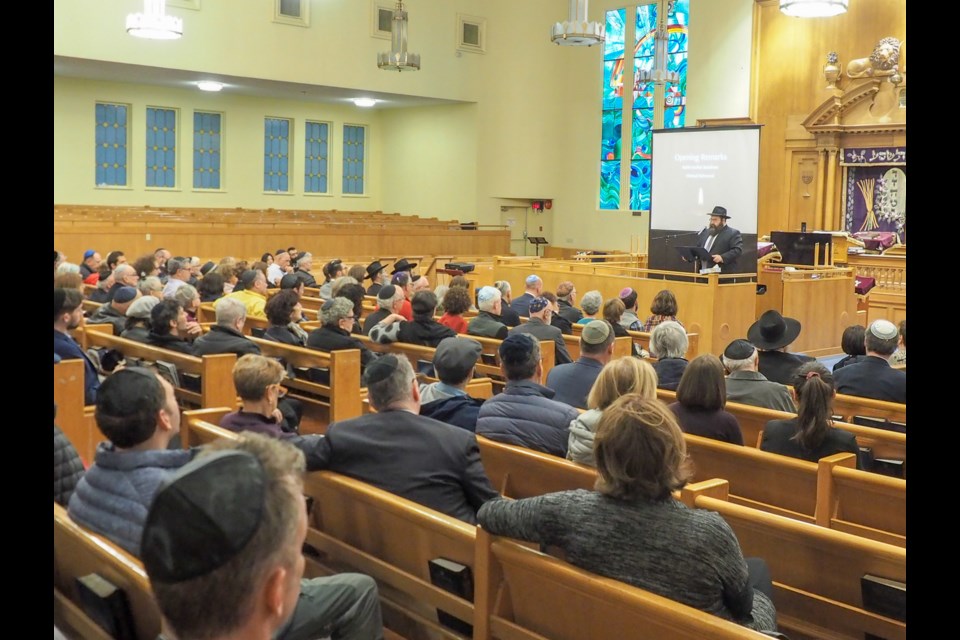More than a week has passed since a mass shooting left one dead and three injured at Chabad of Poway synagogue in California but its aftershocks continue to shake Jewish communities — even one in the Tri-Cities.
And it's not just horrific events like Poway or the massacre six months earlier at the Pittsburgh Tree of Life synagogue that have Jewish groups rattled.
For instance, five days after the California shooting, on Yom Ha’Shoah, otherwise known as Holocaust Remembrance Day, a massive Nazi swastika was being removed from a building in South Vancouver.
Those kinds of dark coincidences put people like Shoshana Szlachter on edge. As the past president of Burquest Jewish Community Centre in Coquitlam, she worries the open-door policy upon which her community prides itself could be coming to an end.
“On Jewish High holidays, we talk about extra security,” said Szlachter. “It’s beyond tragic.”
Hate crimes have risen exponentially in Canada over the last few years. In 2016, anti-Semitism spiked and has been on an upward trajectory ever since. In an annual audit of anti-Semitic incidents released just two days after the Poway attack, B’nai Brith Canada documented more than 2,000 incidents across the country, a first since the organization started tracking hate in 1982.
Of the 29 synagogues and Jewish cultural centres across Metro Vancouver, many have been on heightened alert since the Poway shootings.
And it's no passing posture. Underneath the police presence, Jewish institutions throughout the Lower Mainland have been quietly overhauling their security training and protocols to ward against a potential deadly attack.
Much of the effort has been led by one man: Coquitlam’s Daniel Heydenrych, who heads security for the Jewish Federation of Vancouver.
With white nationalism on the rise and the Jewish community spread out across the region, the former soldier was brought in to boost security, building by building.
Heydenrych spent two decades in the British army, deployed to places like Iraq, often protecting reconstruction crews at a time when insurgents ramped up their attacks on Western forces. For the next several years, he took skills to the private sector, working to protect non-profit staff across some of the more volatile corners of the planet, including several parts of Africa and central Asia.
Today, Heydenrych said he has added traditional security officers — many former police or military, none of them armed — to almost all the synagogues and services in the Lower Mainland but that measure, on its own, isn’t good enough.
“We can pay to have the one security officer or two security officers on the door but if you have services, especially a large service or a special event around the key holidays, you can have 1,200 to 1,500 people coming through that door,” Heydenrych told The Tri-City News.
To fill the gap, Heydenrych says he has held more than a dozen training sessions over the last year, each one slowly turning ushers, volunteers and greeters into a synagogue’s first line of defence.
When Heydenrych goes into a synagogue to beef up security, what emerges is a kind of informal community police force, his “eyes and ears,” as he puts it. He teaches them to look out for pre-attack indicators, such as suspicious body language or the wrong greeting.
“[If] they've all gone through this training. I know have 15 sets of eyes instead of two sets of eyes,” he said.
While the newly trained staff slip out of fire escapes and familiarize themselves with lock-down locations, Heydenrych is careful to point out they shouldn’t think of themselves as security.
“Vancouver is not Iraq,” he said. “You don't want to make it a prison.”
So far, much of the security training has been held in Vancouver, something Heydenrych admits is a problem for communities like the Tri-Cities where people are often left out because of the distances. At the same time, it’s often the middle-sized communities where you see the largest amount of attacks, says Heydenrych.
“The further out you go from any city core, you tend to get less multicultural, less tolerant,” he said.
Heydenrych says he’s now turning his attention to Vancouver’s outlying communities, and is in talks with the RCMP to help train staff at Burquest.
But the training, security cameras, extra lights and hardened doors cost money, and Heydenrych said he’s putting in another funding application in July to the federal government’s security infrastructure program for at risk communities.
Until then, Burquest’s Szlachter says the community centre is determined to keep its doors open.
“He’s a real soldier,” she said of Heydenrych. “I hope we don’t need him.”



